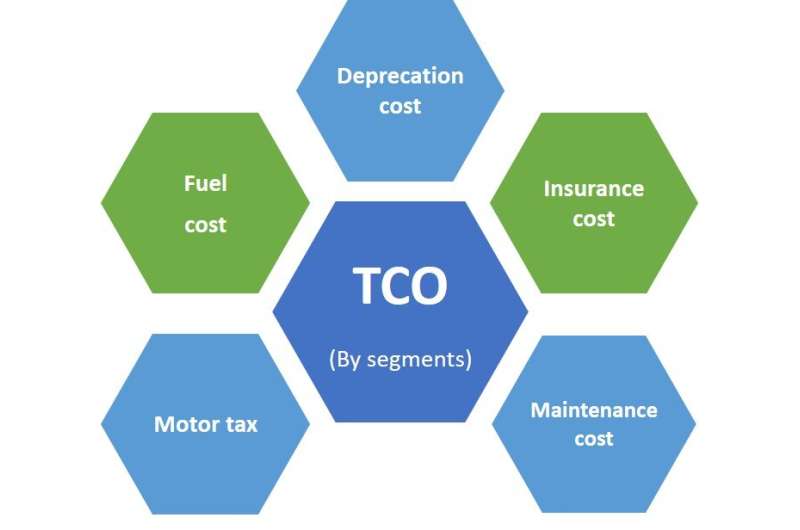Variability in total cost of vehicle ownership across vehicle and user profiles

The widespread penetration of electric vehicles (EVs) has emerged as the leading technological pathway for cutting levels of carbon emissions from road transport activity. Although the up-front purchase costs are often the focus for consumers, the total cost of ownership (TCO) of EVs relative to internal combustion engine vehicles (ICEVs) is a critical metric for informing consumer decision-making and for supporting associated policy design. Researchers from EnvEcon Decision Support and University College Dublin analyzed the TCOs of a variety of cars and driving profiles in a defined framework of taxes, grant and fuel prices in order to deliver a granular and detailed assessment of the variability that exists in TCO and the consequent relevance to consumer decision making and policy design.
The study was published in Communications in Transportation Research.
Although the initial capital expenditure on a vehicle accounts for a substantial part of the TCO, which is largely determined by the characteristics of that vehicle, the TCO can also vary greatly depending on vehicle type, vehicle use, charging needs and energy costs. "We hypothesize that these variations matter, and so, for example, to bridge the gap of neglecting the impacts of specific driving patterns on the TCO, we utilized detailed national car-test data to determine annual driving distances from different vehicle-class segments in a refined manner so as to build on and enhance the TCO methods applied in prior research. This enables a far more granular estimation of current TCOs in the national market being assessed." said the researchers. "We find that substantial variability exists in TCOs across both car segments and car user profiles."
The TCO of battery EVs (BEV) is lower without subsidy than many ICEVs over 4, 8 and 12 year ownership terms. This is despite the open-market selling price of battery EVs, at the time, being far higher than ICEVs from those same segments. This analysis suggests that a comprehensive understanding and estimation of TCO would therefore be key to guiding improved decision-making by consumers in terms of vehicle purchase decisions and also for policymakers interested in understanding and influencing those purchase decisions. "In our case country of Ireland, the operational cost-savings of EVs combined with the existing grant supports, render BEVs cost-competitive across many key segments."
Depreciation costs remain the highest cost, circa 70%, for all types of cars in the study, confirming that just owning a car is expensive. First generation BEVs, with more rapid depreciation rates, fare less well relative to comparable ICEVs options. However, policy and technological progress are expected to continue to exert a strong influence on depreciation values in the near future. De facto bans on new ICEV sales, restrictions on ICEV roadworthiness tests, and the expected evolution and "settling" of new BEV technologies that deliver more stable resale prices for 2nd generation EV models, are all expected to play an important role in the relative TCOs of ICEs and EVs in the near future through an influence on depreciation costs. Analysis of these changes will enable identification of the points where and when subsidies can be phased out or taxes adjusted for specific BEV options.
An important takeaway point is that the market share of BEVs does not yet reflect the cost advantage of BEVs in many popular segments, and it is reasonable to assume that improved communication on TCO can help consumers with decision-making. This should be supported by an independent, credible, and accessible, information portal for the public in relation to the TCO of EVs and ICEVs for specific user profiles.
The development of the second-hand BEV vehicle market is also identified as being particularly relevant, particularly in Ireland with the absence of a car manufacturing industry requiring all vehicles to be imported. Ireland is now the only right-hand drive vehicle country in the EU. The UK has traditionally been the primary source of imported used vehicles, however, BREXIT has increased the costs, in terms of tax and bureaucracy, of importing vehicles from the UK market to Ireland. These developments are likely to be an impediment to the growth of the second-hand EV market in Ireland and thereby the speed of EV diffusion.
The researchers emphasized that as large-scale financial compensations are inevitably phased out, it will be of benefit to policymakers to consider how to stimulate elements of the TCO of ICEVs (e.g., fuel cost and depreciation) as part of the ongoing strategy to shift future car sales to EVs.
More information: Yulu Guo et al, Variability in total cost of vehicle ownership across vehicle and user profiles, Communications in Transportation Research (2022). DOI: 10.1016/j.commtr.2022.100071





















